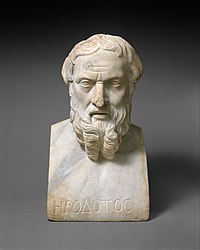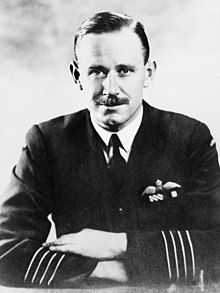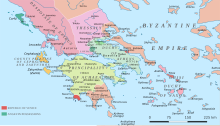Portal:History
The History Portal

Herodotus (c. 484 BC – c. 425 BC) is often
considered the "father of history"
History (derived from Ancient Greek ἱστορία (historía) 'inquiry; knowledge acquired by investigation') is the systematic study and documentation of human past. History is an academic discipline which uses a narrative to describe, examine, question, and analyze past events, and investigate their patterns of cause and effect. Historians debate which narrative best explains an event, as well as the significance of different causes and effects. Historians debate the nature of history as an end in itself, and its usefulness in giving perspective on the problems of the present.
The period of events before the invention of writing systems is considered prehistory. "History" is an umbrella term comprising past events as well as the memory, discovery, collection, organization, presentation, and interpretation of these events. Historians seek knowledge of the past using historical sources such as written documents, oral accounts or traditional oral histories, art and material artifacts, and ecological markers. History is incomplete and still has debatable mysteries.
Stories common to a particular culture, but not supported by external sources (such as the tales surrounding King Arthur), are usually classified as cultural heritage or legends. History differs from myth in that it is supported by verifiable evidence. However, ancient cultural influences have helped create variant interpretations of the nature of history, which have evolved over the centuries and continue to change today. The modern study of history is wide-ranging, and includes the study of specific regions and certain topical or thematic elements of historical investigation. History is taught as a part of primary and secondary education, and the academic study of history is a major discipline in universities.
Herodotus, a 5th-century BCE Greek historian, is often considered the "father of history", as one of the first historians in the Western tradition, though he has been criticized as the "father of lies". Along with his contemporary Thucydides, he helped form the foundations for the modern study of past events and societies. Their works continue to be read today, and the gap between the culture-focused Herodotus and the military-focused Thucydides remains a point of contention or approach in modern historical writing. In East Asia a state chronicle, the Spring and Autumn Annals, was reputed to date from as early as 722 BCE, though only 2nd-century BCE texts have survived. The title "father of history" has also been attributed, in their respective societies, to Sima Qian and Ibn Khaldun. (Full article...)
Featured picture
Did you know (auto generated)

- ... that Massachusetts gave the United States its first openly LGBT state legislator to be elected, as well as the first out congressperson and state attorney general?
- ... that the elite men's race at today's London Marathon is expected to feature three of the five fastest men in history?
- ... that pianist and composer Josef Weiss created the first film score in the history of German cinema?
- ... that BoysTown was reported as having the largest case of child abuse in Australia's history?
- ... that at over 400 pounds (180 kg), Desmond Watson is one of the largest players in NCAA Division I football history?
- ... that officials said this year's Louisiana wildfire season includes the largest wildfire in the state's history?
Calvin Coolidge (born John Calvin Coolidge Jr. /ˈkuːlɪdʒ/ KOOL-ij; July 4, 1872 – January 5, 1933) was an American attorney and politician who served as the 30th president of the United States, from 1923 to 1929. Born in Vermont, Coolidge was a Republican lawyer who climbed the ladder of Massachusetts politics, becoming the state's 48th governor. His prompt and effective response to the Boston police strike of 1919 thrust him into the national spotlight as a man of decisive action. The next year, Coolidge was elected the country's 29th vice president and succeeded to the presidency upon the sudden death of President Warren G. Harding in August 1923. Elected in his own right in 1924, Coolidge gained a reputation as a small-government conservative with a taciturn personality and dry sense of humor that earned him the nickname "Silent Cal". His widespread popularity enabled him to run for a second full term, but Coolidge chose not to run again in 1928, remarking that ten years as president would be "longer than any other man has had it—too long!"
During his gubernatorial career, Coolidge ran on the record of fiscal conservatism, strong support for women's suffrage, and vague opposition to Prohibition. During his presidency, he restored public confidence in the White House after the many scandals of the Harding administration. He signed into law the Indian Citizenship Act of 1924, which granted U.S. citizenship to all Native Americans, and oversaw a period of rapid and expansive economic growth known as the "Roaring Twenties", leaving office with considerable popularity. He was known for his hands-off governing approach and pro-business stances; biographer Claude Fuess wrote: "He embodied the spirit and hopes of the middle class, could interpret their longings and express their opinions. That he did represent the genius of the average is the most convincing proof of his strength." (Full article...)On this day
September 23: Celebrate Bisexuality Day
- 1122 – Pope Callixtus II and Holy Roman emperor Henry V agreed the Concordat of Worms (pictured), ending the Investiture Controversy.
- 1642 – First English Civil War: The Battle of Powick Bridge, the first engagement between the primary field armies of the Royalists and the Parliamentarians, ended in a Royalist victory.
- 1884 – The French steamship Arctique ran aground on the northern coast of Cape Virgenes in Argentina; gold was discovered during the rescue effort, triggering the Tierra del Fuego gold rush.
- 1920 – The Louisiana hurricane dissipated over Kansas after forcing around 4,500 people to evacuate and causing $1.45 million in damages.
- 2010 – Teresa Lewis became the first woman to be executed by the U.S. state of Virginia since 1912, and the first woman in the state to be executed by lethal injection.
- Augustus (b. 63 BC)
- Sir Richard Hughes, 1st Baronet (d. 1779)
- Émilie Gamelin (d. 1851)
- Zdenko Blažeković (b. 1915)
Selected quote
What transforms this world is — knowledge. Do you see what I mean? Nothing else can change anything in this world.
— Yukio Mishima, Japanese author
Related portals
More Did you know...
- ... that on 26 April 1881 HMS Doterel (pictured) exploded, killing 143 of the 155 crew members?
- ... that causes of the deaths at the Berlin Wall included shooting, drowning, suffocation, suicide, and falling from a balloon?
- ... that the 19th-century swindler Bertha Heyman, known as "The Confidence Queen," conned men by pretending to be a wealthy woman who was unable to access her fortune?
- ... that only four great uncial codices have survived until the present day?
- ... that after World War II, Polish resistance organizer and Warsaw Uprising fighter Jan Mazurkiewicz was brutally tortured by the authorities in communist Poland?
- ... that tiny Paederus beetles may have caused some of the ten Plagues of Egypt?
- ... that the only known report of bloodshed during the simulated Nazi invasion of Winnipeg was from a woman who cut her thumb while preparing toast?
- ... that Dacian bracelets were used as currency and votive offerings?
Topics
Categories

History • By period • By region • By topic • By ethnic group • Historiography • Archaeology • Books • Maps • Images • Magazines • Organizations • Fictional • Museums • Pseudohistory • Stubs • Timelines • Chronology • People • Wikipedia historians
WikiProjects
![]() WikiProject History •
Ancient Near East • Australian History • Classical Greece and Rome • Dacia • Former countries • History of Canada • Chinese history • European history • Heraldry and vexillology • Indian history • Jewish history • Medieval Scotland • Mesoamerica • Military history • Middle Ages • History of Science
WikiProject History •
Ancient Near East • Australian History • Classical Greece and Rome • Dacia • Former countries • History of Canada • Chinese history • European history • Heraldry and vexillology • Indian history • Jewish history • Medieval Scotland • Mesoamerica • Military history • Middle Ages • History of Science
WikiProject Time • Days of the Year • Years
WikiProject Biography • Composers • Political figures • Saints • United States Presidents
Things you can do
 |
Here are some tasks awaiting attention:
|
Associated Wikimedia
The following Wikimedia Foundation sister projects provide more on this subject:
-
Commons
Free media repository -
Wikibooks
Free textbooks and manuals -
Wikidata
Free knowledge base -
Wikinews
Free-content news -
Wikiquote
Collection of quotations -
Wikisource
Free-content library -
Wikiversity
Free learning tools -
Wiktionary
Dictionary and thesaurus






















































